This is your monthly roundup. Let’s get right to it.
Young People are Young and Stupid
As a reminder that yes college students are often young and stupid and wrong about everything, remember the time they were behind a ban on paid public toilets? This is a central case of the kind of logic that often gets applied by college students.
No One Voted for This
HR and Title IX training seems like it’s going a lot of compelled speech in the form of ‘agree with us or you can’t complete your training and the training is required for your job,’ and also a lot of that compelled speech is outright lying because it’s confirmation of statements that are universally recognized to be insane?
Robin Hanson: Scenario: 2 women talking. X, married to woman, announces is pregnant. Y asks how they got pregnant, was it friend, donor, or IVF? 3rd person overhears, wonders if they should immediately intervene in convo to tell Y they are discriminating. Should they?
Context: This is example given in my workplace harassment/discrimination training, & one can't move on unless one agrees that 3rd person should intervene.
My training says "Those questions are a little invasive!"
Training by Vector Solutions.
I do realize Robin’s followers can be odd, but yeah, not this time, and this is 87-1.
They also forced people to affirm the ‘affirmative specific consent’ rule, which voters disapproved of by 11-1.
Discrimination
Hard to pronounce names constitute 10%-50% of ethnic penalties among economics PhD job candidates, says new AEJ piece.
Qi Ge and Stephen Wu: The results are primarily driven by candidates with weaker résumés, suggesting that cognitive biases may contribute to the penalty of having a difficult-to-pronounce name.
Given this was not a controlled experiment, I’d ask if choosing an unpronounceable name is correlated to other parental characteristics that matter here.
The good news is you can solve for this - you can change your name.
A paper via MR says that across seven studies ‘attractiveness discrimination’ goes undetected because people lack the ability to do so, not because they think it is fine, and warn that interventions to increase salience of the issue would likely decrease detection of gender and race discrimination.
My read is that the people saying they disapprove of this type of discrimination are mostly lying, or at least answering in a far philosophical mode that they do not endorse in actually-making-decisions mode. When we make more and more justifications for decision making unacceptable, we mostly introduce illegibility into the decision making process and prevent the keeping of records.
People want to spend time around and interact with others they find attractive, and they correctly expect others to want to do the same. It is both more pleasant in the moment, and also, hey, you never know. They are going to find a way.
Looks are heritable, so how much does lookism increase inequality? Looking only at earnings does not measure the main impacts, but it is a start.
Abstract:
Since the mapping of the human genome in 2004, biologists have demonstrated genetic links to the expression of several income-enhancing physical traits. To illustrate how heredity produces intergenerational economic effects, this study uses one trait, beauty, to infer the extent to which parents’ physical characteristics transmit inequality across generations.
Analyses of a large-scale longitudinal dataset in the U.S., and a much smaller dataset of Chinese parents and children, show that a one standard-deviation increase in parents’ looks is associated with a 0.4 standard-deviation increase in their child’s looks.
A large data set of U.S. siblings shows a correlation of their beauty consistent with the same expression of their genetic similarity, as does a small sample of billionaire siblings. Coupling these estimates with parameter estimates from the literatures describing the impact of beauty on earnings and the intergenerational elasticity of income suggests that one standard-deviation difference in parents’ looks generates a 0.06 standard-deviation difference in their adult child’s earnings, which amounts to additional annual earnings in the U.S. of about $2300.
I am surprised all these effects are so small. Clearly missing $2300 a year is nothing. Most people would, I presume, happily pay $2300 for 0.4 standard deviations of improved looks even if it did not impact their earnings directly.
Lookism is also highly persistent. In two studies, this paper found that educating judges to not bias on looks had no practical impact on the advantages of ‘looking trustworthy’ during sentencing. Then they tried having judges form their decision without looking, but with the opportunity to revise later, and found that this actually increased the bias, as judges would often modify their decisions upon seeing the defendant. People seem to very strongly endorse lookism in practice, no matter what they say in theory.
Men sexually objectified during interviews, by both men and women, did not suffer decreased performance, and did not report much harassment, whereas those watching videos expected decreased performance and greater feelings of harassment. Sample sizes were not so large, so one possibility is that the negative effects occur mostly in a small number of extreme negative reactions.
My guess however is that this result is mostly correct, there is little net impact on performance and men mostly don’t care, sometimes actively don’t mind, and are often oblivious to such matters, whereas those watching on video were primed to look for it, and once you are in that mindset and asked about it of course people will say they expect a performance hit.
As additional data, I will say that to the extent that I have ever been sexually objectified, it has never to my knowledge had a negative impact on my life experience or my performance, in any sense.
Might want to come into the office. Paper says:
Employees who work from home (WFH) are less likely to be considered for promotion, salary increase & training than on-site workers. The pay & promotion penalties for WFH are particularly true for men (both fathers & non-fathers) & childless women, but not mothers. We also find that employees operating in teams with a higher prevalence of WFH do not experience negative career effects when working from home.
If others are meeting in person, they will conspire against you, and see you as less valuable. It will not go well for you. I found this out the hard way. That does not mean it is not worth working from home, I would do it again, but understand the price.
Study claims that white flight from Asian immigration is a thing in California public schools among the wealthy. MR commentator raises doubts on validity, OLS gives a different result, the measures aren’t robust or justified, also points out that since one does not simply build housing a lot of this is pure replacement effects.
If you argue as the paper does that whites and Asians are both responding to increases in school quality to explain why the naive OLS impact measure looks negative, while Asians directly impact both school quality and style by being present, you beg the question. There are several reasons the effect here might be real, especially the stacking of the college admissions deck geographically in the name of diversity, where whites should fear that being in an Asian school district means their kids will be at a disadvantage, and also a clash of desired school styles, or of course simple racism is a thing, but those considerations also apply to non-white non-Asians.
Based on the extensive documented objections I am going to put this on NIMBY, and presume that the reason whites are leaving is mostly the fixed number of available houses.
Morality
Moral Thin-Slicing via MR, here’s the abstract:
Given limits on time and attention, people increasingly make moral evaluations in a few seconds or less, yet it is unknown whether such snap judgments are accurate or not. On one hand, the literature suggests that people form fast moral impressions once they already know what has transpired (i.e., who did what to whom, and whether there was harm involved), but how long does it take for them to extract and integrate these ‘moral atoms’ from a visual scene in the first place to decide who is morally wrong?
Using controlled stimuli, we find that people are capable of ‘moral thin-slicing’: they reliably identify moral transgressions from visual scenes presented in the blink of an eye (< 100 ms).
Across four studies, we show that this remarkable ability arises because observers independently and rapidly extract the atoms of moral judgment — event roles (who acted on whom) and harm level (harmful or unharmful). In sum, despite the rapid rate at which people view provocative moral transgressions online, as when consuming viral videos on social media or negative news about companies’ actions toward customers, their snap moral judgments about visual events can be surprisingly accurate.
I interpret this result as strong evidence that when people talk about ‘morality’ they mostly mean something quite superficial, the superficial surface appearance of morality. If the mere superficial surface appearance of morality - which is all one can possibly hope to measure in milliseconds - is then described as ‘accurate’ then that is all that later judgments are measuring.
The first example given in the paper is a doctor forcibly removed from a United flight. People judged his removal from his seat ‘immoral,’ despite the agreed upon legal system not entitling him to a seat. So the fact that he had physically sat down, combined with him being a good person, made it moral for him to appropriate the seat and ‘immoral’ to remove him. Why is this a ‘moral transgression’? Because we say it is, which is because of what it looks like in those 100 ms. Whereas if the doctor had given off a different vibe, as picked up in those 100 ms, then removing him would have been fine.
Thus, I say all the claims about ‘moral judgments are complex’ here are bullshit. Yes, if you wanted your moral judgments to be consistent, to provide good incentives, to measure what the actual best decision was for the good of all, or any neat stuff like that, moral decisions are often complex and can be infinitely complex. If you want to give an AI system a moral code that does what we want, that’s incredibly complex. If you study moral philosophy, that never ends.
All that would require being willing to look at people’s actual moral judgments, in many cases, and quite correctly say you are all wrong.
Only Connect
What conclusions make sense to draw from this graph of suicide rates, originally from Bowling Alone, combined with people now experiencing peak happiness after age 60, versus people previously peaking much younger?
Yes, the numbers are pretty scary.
One option, which is how Ted Gioia reads this, is it is generational, a new malaise impacting the young. That can at most explain the half that’s getting worse. The other half is things getting better over time. The theory of (negative) change here is atomization and lack of connection, but people tend to lose connections on net as they get older rather than gain them?
The timing also really does not line up with ‘blame social media.’ Social media might make it harder to make connections, or it might make it easier, but the problem and the entire above graph predate smartphones and all social media. I do continue to think we should ban smartphones in schools (to the extent we don’t instead ban the schools) but the problem goes deeper.
Here are Ted’s core suggestions:
Here are my eight pillars of connection—and none of them require Wi-Fi access.
If you want a happy life, you nurture them. If you let them all topple, you’re at grave risk.
Connection with the natural world;
Connection with family, friends, neighbors, colleagues;
Connection with history and tradition;
Connection with the community via institutions and organizations (e.g., civic engagement);
Connection via charitable acts, and giving (material and emotional) support;
Connection with spiritual and other metaphysical or higher values—sources of meaning outside the materialist realm;
Connection with creative human expression in art;
Connection via all those other things a computer can't provide (love, forgiveness, fidelity, trust, empathy, kindness, etc.).
We have an existence proof, in the form of all of human history before 2010, that human connection does not require a screen at all, let alone wi-fi. That doesn’t mean you can or should throw out all that the new technologies have to offer, either in these fields or elsewhere. Both there’s a lot more to life than connection, and you can use your phone to connect if you use it wisely. It’s weird to say ‘do the things a computer can’t provide’ as if the computer not providing them makes them better. Seriously, how did we ever communicate and coordinate or find out things before? I vaguely remember and it was super annoying.
In terms of what connections are most important, that’s going to vary from person to person. Think about what would actually work best for you, and note that #2 seems to tower above the rest, especially if you include the missing element of having children.
It’s Not Me, It’s Your Fetish
You can’t knock ‘em, out, you can’t walk away, but you can sell them feet pics?
Lilly Allen (yes that one, TIL): Haven't posted in a while but you can still check out the archive [shows some feet pics]
ColdEdge: Imagine being one of the biggest pop stars/musicians in Europe and then being reduced to this.
Lily Allen: imagine being and artist and having nearly 8 million monthly listeners on spotify but earning more money from having 1000 people subscribe to pictures of your feet. Don’t hate the player, hate the game.
Lily Allen charges $10 a month on OnlyFans, of which she keeps $8 after the 20% site cut, or $8k/month. So this is weird, because every calculator says that she should expect in the range of $34k/month in streaming income - but I do not think she would be lying about this.
It Takes a Village You Don’t Have
Cartoons Hate Her reports that the problem with ‘it takes a village’ and having community is that we don’t actually want all the obligations or to interact with the people who happen to be physically near us. We don’t want it enough to be the kind of reliable and generous that makes this happen. Sounds right.
Stephanie Murray reports that the village thing can still be done, and in particular has pulled off a ‘baby swapping’ system that periodically pools child care so parents can have time for themselves. Great idea. The catch is that you have to give up your say in what happens during that time, in terms of your kids getting exposed to high fructose corn syrup, or screen time, or anything similar. The other catch is that you need a walkable neighborhood, which most people don’t have.
Owen Cyclops similarly notes that your village can only help if they know what you need from them and what roles you should have, and we’ve made everything contingent and special and negotiable, which makes that much harder. Yes, everyone always wanted the ‘perfect village’ but you used to take what you can get, and now you don’t. That seems closer to the issue, that we now have the optionality to reject or accept every individual interaction and relation each time, and aren’t willing to settle for the rather expensive-in-time-and-boredom thing that was having a village of whoever was around and accepting social obligations you didn’t like.
The Joy of Cooking
Older homes hid food preparation in the kitchen away from others, because it was so often servants doing it. Now that when we cook at home we cook for ourselves, the new kitchens are open, so the cook can interact with and entertain guests. I love it.
Also, seriously, grilling is awesome and the number one thing I miss living in NYC.
VB Knives: The "grill" did not exist in mainstream American culture until the later 20th century. Neither of my grandfathers ever "grilled." I am not sure they would have known what the word even meant, in reference to cooking. BBQ existed but strictly as an exotic Southern practice.
Grilling really only makes sense in a world where one has a nice backyard but no servants to prepare a meal for one's guests. So one moves the cooking outside where one can socialize and prepare food at the same time.
It also avoids heating up the house, which is always a significant point in favor of outdoor cooking, especially in warm climates.
[chart shows BBQ rising over time, with a big jump in 1900-20 and the big jump being steadily over 1965-2000 or so.]
Barbeque has three big advantages. The first is that it turns the meal into an event, which is of course also the disadvantage that it takes extra effort, but it’s good to have special things. The second is that, let’s face it, barbeque makes things better. It is a superior technology that moves everything on it up a tier even if you don’t get the timing right. If you do a good job throughout, it punches way above its weight, and was reliably the best thing available during the pandemic, we did it weekly.
The third is that it got male coded, allowing men to embrace doing it who would otherwise realize and hate that they are cooking, but actually cooking is great. That’s also a big plus.
Also, a fun periodic reminder.
Matthew Griesser: It is funny that most places in the U.S. mandate that every residence have access to its own private, unlicensed kitchen for cooking, yet we deem it totally unsafe for preparing food to sell to others.
The Joy of Eating
Bill Maher says McDonald’s food is not only delicious, if he had six months to live he would eat it everyday (and if he did that, that he’d then have six months to live).
Clearly, someone only remembers half of Super Size Me. Yes, some people really like McDonalds and other fast food, and most people have some fast food they like a lot. But no, it’s not the actual best, and nothing holds up as maximally delicious every day for more than a week. If I had three months to live, and wasn’t simply in ‘quickly there is no time’ mode, I would eat a wide variety of things, try to hit all the highlights at least one more time.
Decision Theory
Scott Alexander asks why the early Christian strategy of essentially Cooperate-Bot won out over the classic mystery cult strategy of Tit-for-Tat. Historically I don’t know. The strategy here was extreme, not only helping those who could not reciprocate, but those that were actively killing and persecuting the Christians. He has a number of theories for why this worked, and one could add several more related items to it.
You can also see his full review of The Rise of Christianity more generally. That review makes it clear that Christianity had a lot of important unique advantages and opportunities. The existing network of millions of Jews was an advantage its competition did not have, giving them extensive traditions and many structures of beliefs that many people badly needed but that aren’t natural fits for mystery religions.
The Jews themselves could not take advantage of this, because not only do not proselytize they make it actively hard to convert, but the Christians could. One must be careful drawing conclusions from phenomena that seem in hindsight overdetermined. The Christians could have succeeded in spite of the Cooperate-Bot aspect, rather than because of it, as essentially the only players in the game.
One should also note that once they got sufficient numbers, the Christians then not only recruited the less pious and less generous, who were never going to go Full Altruist. They fully pivoted, and started gathering armies and persecuting non-believers for quite a while.
This is consistent with the Cooperate-Bot strategy succeeding early via advertising, heroic appeal and recruitment, and people being good and wanting to join and cooperate with the program and message, and this working well with the innovations regarding afterlife promises that were a huge competitive advantage, but too many such cooperate-bots not being a stable equilibrium.
As in, if you have 1% of the population being cooperate-bot, then if you defect against them you don’t win much, and you would show yourself to be the villain to those paying attention. But if you’re up against 75% cooperate-bot, or 99%, then obviously you defect, and also they were later facing stronger memetic competition, including from Islam. Too much unconditional kindness running around and the defectors and freeloaders win, so you can’t allow that. Thus, the Spanish Inquisition.
Scott then goes on to ask, what is the right strategy today, especially for groups like rationalists or effective altruists, or individuals? I think you have to draw a distinction between those who can’t pay you back, and those who are actively in bad faith and defecting. The part where you help out those who ask up to a point when you can, even without any expectation of specific compensation? That’s mostly great. As is giving everyone epistemic fairness. That’s different from tolerating the bad faith.
You also have to check how much you and yours are correlated with other decisions, and to what extent you are creating bad incentives for others. You mostly want to avoid that.
And again, you need to take care of you and yours first. Help, but do not help beyond your sustainable means. Fully implementing ‘take all you have and give it to the poor’ is at best a kind of Ponzi scheme, because you destroy your means of production. That’s probably another part of the explanation. You can be over-the-top generous and have it work, if and only if this inspires growth of that pattern, but this requires sustained exponential growth. Eventually, most people are now either a Christian, a freeloader or both, and most of you need to get back to work.
Liberal democracy has a lot of the same dynamics. While things are growing rapidly in various senses, you have a lot of slack in the system and it pays to be generous. But a lot of strategies that are appealing and good for people in the short term can’t be sustained in the long term because they aren’t an equilibrium, and the problems with them compound over time.
In other decision theory news, you just can’t rely on people these days.
Romy: You’ve made a pact with a friend that if they commit suicide, you will kill their cat (to disincentivize their suicide). imagine the friend has committed suicide, would you follow through and kill the cat? (result: 83% let the cat live)
Worm Girl: Only if I had at least one other suicidal friend I'd made the same pact with.
We lose a lot through our ubiquitous use of Causal Decision Theory and thus our inability, as a society and individually, to make credible commitments like this. But also if you put me in a situation where I’m told I’ve made a promise I would never have made, should I say I would follow through on that? In which both (1) if I got into that situation for real I would totally do it and (2) because of this I wouldn’t get into the situation? I’m not sure. All I know is, if I say I’m killing the cat, I’m killing the cat.
FTC on the Loose
The FTC is one step closer to instituting a ‘click-to-cancel’ rule. Most everyone agrees this rule would be great if implemented. The problem is that a lot of people are counting their chickens. The FTC’s authority to do this is not so clear. It’s going to be a while before this has any teeth or we find out if it sticks, and it might instead further damage the FTC’s authority (for worse and for better).
FTC also finalizes its rules banning fake online reviews and testimonials, including buying positive reviews, having insiders review without disclosing they are insiders, or paying for fake followers.
Essentially everyone approves of the well-implemented version of this, unless they were busy engaging in fakery. Betsey Stevenson convincingly argues that this is good for the economy. It’s important that such information be reliable.
The problem is, similar to the click-to-cancel rule, does this accomplish that? How will it get enforced? Can it be enforced, without putting undo frictions on the ability of people to post reviews? Will there be jurisdictional issues?
Then there are the other FTC actions, especially those attacking individual companies, which tend to be… let’s say less good.
Byrne Hobart: Every complaint in this thread is the classic Internet argument trick of going “X? By X you most assuredly mean Y, which is a blatant lie, because the truth is of course X.”
Lina Khan (Chair of FTC):
1. Firms that lure workers with false earnings claims are breaking the law. @FTC has taken action against @Lyft for deceiving drivers about how much they could expect to earn on its platform. We've ordered Lyft to stop this conduct & pay $2.1 million.
Oh no, what did Lyft do?
In 2021, Lyft faced a shortage of drivers. It responded with a marketing campaign that routinely inflated how much drivers could expect to earn through its platform—sometimes by as much as 30%. These false claims led to increased sign-ups, with more drivers joining Lyft.
Most drivers would not earn the amounts Lyft advertised. For example, Lyft told potential drivers they could make up to $33/hour in Atlanta and up to $31/hour in Miami. In reality, these figures reflected earnings of the top one fifth of drivers.
FTC: Lyft failed to disclose that these amounts did not represent the income an average driver could expect to earn, but instead were based on the earnings of the top one-fifth of drivers. The complaint notes that these figures overinflated the actual earnings achieved by most drivers by as much as 30%.
What the actual fuck? This is completely insane. That’s what “up to” means. It does not mean “what you should expect.” 20% seems totally fair.
I mean, if you want to ban the phrase “up to” and force only advertising of median earnings, as per the consent decree here, then… I have no idea how that survives first amendment scrutiny but in practical terms I guess fine?
Have they never seen a sale where items are “up to 90% off?” If that only applied to 20% of store items, are they going to sue the store?
Lina Khan: Lyft also enticed drivers by promoting "earnings guarantees," which supposedly guaranteed that drivers would be paid a certain amount if they completed a specific number of rides in a certain time—like an offer of $975 for completing 45 rides in a weekend.
In reality Lyft would only pay drivers the difference between what they actually earned and Lyft's advertised guaranteed amount. Drivers were clearly deceived, with tens of thousands reporting that Lyft's claims had misled them.
Seriously, what the actual fuck? Yes, that is what an earnings guarantee is. It means you get at least $975 if you compete 45 rides. So Lyft paid the drivers a minimum of $975 for 45 rides. If it was a bonus they’d have called it a “bonus.”
Richard Hanania: I hope this helps you understand that the modern antitrust movement is little more than a vehicle for anti-market sentiments.
FTC also scores this win: Right to repair may soon enable the fixing of McDonalds ice cream machines. Let’s not get ahead of ourselves, this still has various steps to go before it actually happens. It’s funny how much that one case got focused on over the rest of what right to repair means. The real value is going to be in things like farm equipment, medical equipment, cars and household appliances and consumer electronics especially iPhones.
Also, sure, McDonalds ice cream machines. If you actively want a McFlurry, you should be able to get one.
Good News, Everyone
Scott Alexander reports from the Progress Studies conference. Everywhere but AI, I quibble on details but it’s all great stuff. On AI, ‘supports acceleration out of a general obligation to progress but feels weird and bad about it’ seems like a good description, on many levels. It’s not a good reason. But yes, otherwise, great stuff.
Prediction market fun for the whole family, as a side note treat.
Stats: A wallet moved $3,000,000 to Polymarket today and put it all immediately on "YES" for Trump. His only issue: he cleared the whole order book and bought $274,300 worth of shares at 99.7%.
Meanwhile, after the French whale won $50 million by commissioning private polls based on the neighbor method (you ask ‘who are your neighbors voting for?’), France’s gambling regulator is preparing to ban Polymarket. Can’t have the French working hard or earning big money.
On the debates as to whether the logic involved and the result should be considered a big ‘win for prediction markets,’ remember conservation of expected evidence. Suppose Harris had won. Would that have been a ‘big loss for prediction markets’ and the logic used by the whale? There’s no obviously right answer, but consistency is necessary.
The story of Google’s internal prediction market efforts over the years.
Paper observes that the possibility of immigration leads to skilling up of those aspiring to immigrate, many of whom remain put. This can mitigate or in theory reverse the brain drain effect in the medium term.
Bookstore where anyone can rent a shelf to feature anything they like, and it’s a much better store because people chose things they loved and wanted to share, or things they made. I mean, if you want the best sellers or whatnot you can go on Amazon.
Banana Con Panna: Make peace with death bc it’s inevitable: ✅
Death makes life more meaningful: ⛔️, skill issue, generate meaning harder lol
Monk: my views regarding anything transhumanism related are quite libertarian and tolerant
If YOUR death gives your life meaning, godspeed; I respect it and far be it from me forcing anyone to stay alive.
If MY death gives your life meaning, then we're at war.
Noah Smith reports he used to be an economist who endorsed a bunch of highly economically destructive propositions in the name of progressivism in the 2010s when everyone else on the left was doing it, and now years later the vibes have shifted so he can notice that some of them are deeply economically destructive? Yet he still frames this as the issues being ‘stuck,’ as if more progressive always equals good, and that therefore he ‘feels adrift.’
Have you tried this? More importantly, have you tried skipping the first two steps?
Aerto: >reach out to junior level swe
nothing
> reach out to senior swe
nothing
> reach out to CTO
replies, gives resume advice, and puts me in contact with person running the internship team
why does this keep happening
It turns out Richard Feynman’s peak bench press was 160 pounds, at age 55 (!), which means both it’s never too late to lift and also there’s something worth doing where you can plausibly outdo Richard Feynman.
Shaggy: The optimal amount of people not liking you is not zero. I only realized this for the first time just now and it fixed everything.
This is importantly true in non-trivial ways, you really do want to be fine with some people not liking you and not expend too much effort to prevent this. But also remember to reverse any advice you hear, some people need the opposite message.
Chinese hire real women to walk on treadmills in place of mannequins, to give an illustration of how the clothes look as you walk. Yet another job the robots will take from us soon? For now, a chance to get paid and also get some light exercise. I have wide uncertainly how often they get hit on.
Via MR, cognitive behavioral therapy had dramatic positive effects on Ghana’s rural poor after 1-3 months, ‘show strong impacts on mental and perceived physical health, cognitive and socioeconomic skills, and economic self-perceptions.’ It’s pretty weird that mental health is objective here while physical health is ‘perceived.’ It is also worth noting that none of the measures listed above represents a clear objective measure from the outside. I do think it is likely such interventions are good on the margin, I am highly skeptical of any claims to large effect sizes.
Antisocial Media
The problem in a nutshell (no link is intentional)? (Yes, he then shares the clip.)
In Defense of ‘Surveillance Capitalism,’ arguing that big tech tracking your actions online is good, actually. I agree on targeted advertisements, and in general I do not think the surveillance is the problem in any of this.
It does damage your reputation when you share fake news, and people understand this and are reluctant to share it, even when it matches one’s political beliefs.
Ann Selzer, after one very wrong poll, ends her election polling. Sad. We need pollsters willing to be wrong. Not only do we lose the pollster most willing to be wrong, who was thus often the most right and definitely offered the most value added, who is going to pick up that legacy now? It turns out we have reason to believe she would have retired at this point either way, she was 67, but… yeah, no one is going to remember that.
Tim Cook finally learns that people name their group chats. The rest of his WSJ profile was less fun, and I didn’t come away thinking I’d learned much beyond that the Vision Pro is something he cares about more than I expected. He calls it an ‘early adapter’ device at this point, so fair enough. I do see myself getting a lot of use out of some AR/VR device in a few years, but it will be a few years, and that’s not about price.
In a fun post via ACX that I’d read first if you’re curious, Naomi Kanakia spins the hypothetical that if you use all the ‘is social media bad?’ tests and instead apply them to reading books, you would get a book called The Literary Delusion, that argues that books are actually quite bad for you, far worse than social media, with high-brow books being worst of all. It’s a fun exercise, but ultimately I think it’s clearly wrong.
Australia prepares to set social media minimum age to 16, without specifying an enforcement mechanism, presumably due to there being no non-awful enforcement mechanisms. At best it’s a pain and a gigantic honeypot, and actual enforcement like ‘scan your face to sign in’ is crazytown. I don’t agree with Tyler Cowen that this kills anonymous posting, you can have verification, although I assume with AI we are already headed in that direction, to at most pseudonymous posting which verification can allow.
It seems fine to have ‘illegal but not strictly enforced’ as a category? As in, there’s a whole range of vice items that have age minimums attached, and everyone knows you can get around the limits if you care enough, but it’s a trivial inconvenience and means you can’t be as public and open about using it, and this is sometimes good where both ‘fully allowed’ and ‘actually not allowed’ would both be worse.
Indeed, consider the central case of this, which is alcohol. I definitely do not want any 15 year old to be able to walk into a convenience store and buy a 6-pack of beer. I also definitely do not want to make it actually impossible for anyone under 21 or even under 18 to ever consume a beer. I don’t know if our current level of difficulty is right, presumably it isn’t, but it’s more plausibly right than either extreme.
As in, we need to not be so dismissive of soft paternalism, as a compromise.
Elon Musk (69 million views, nice): There will be consequences for those who pushed foreign interference hoaxes.
The Hammer of Justice is coming.
Technology Advances
Michael Arouet: One really needs magnifying glasses to find European tech sector in this chart. Europe used to be innovative and drove new technologies. Why is Europe so badly lagging behind the US now? What happened?
Yes, Europe is in red here, it’s just so tiny it’s almost impossible to see.
For Science!
Tyler Cowen points to a new working paper from Kevin Lang, that notices that under reasonable assumptions, it would take a t-score of 5.48 to reject the null hypothesis in an economics paper with 95% confidence, with 65% of narrowly rejected hypotheses and 41% of all rejected hypotheses remaining true. Notice that this is the optimistic conclusion that assumes everyone’s methodology is good and no fraud or large mistakes are involved, so it is much worse than this.
Cognition
When asked to estimate caloric intake, study participants who were allowed to form their own opinions before seeing others’ estimates did worse, because they put too much weight on their own opinions. This seems transparently right in the case in question, where the average participant has no reason to think their estimate is any more accurate than anyone else’s, so if you don’t care about the epistemic commons you should take a straight average.
Outside of a laboratory, it is rare that you can be this confident that you can trust other opinions as much as your own, so people have learned not to do that. Also, someone who fully did that would likely not learn as well. And if everyone takes the average, then the average gets worse, and so on.
Another paper that is very closely related reports that in most studies where there is social information available, people undervalue that information. One should be wary before incorporating such social information, and read the paper. There we find that they assume the conclusion, that if you rely on others opinions less than your own then that is considered underusing social information. You are not to treat your own information any differently from the information of others. In scenario type after scenario type, participants not following this rule are sneered at.
Certainly there is some error here due to anchoring and worry about looking foolish and such, which collectively drives down willingness to incorporate outside info properly in such circumstances. In context, yes, people are collectively messing up.
But as a generalized principle, the suggested rule of full indifference between information sources is utterly insane. Even in these idolized cases, there are plausible points of failure for the information of others that don’t apply to your own. Even if you can’t put your finger on one, few of the unknown unknowns favor the information of others. Even in a lab, experiments often involve confederates, lies or tricks, and people’s decision algorithms are designed for the tricker and trappier real world. They need to be robust against potential social attack. The discussion section considers this, as well as other explanations. This includes the important point that you need to worry that others got their information socially. If no one puts any additional weight on their own information, then information cascades are inevitable and devastating.
The authors cite examples of ‘failure to use social information’ that include vaccine hesitancy and climate change skepticism, which clearly shows another side of social information, where the authors think it is obvious which social information to trust and which way it should point, and I am confident that those that reach the other conclusions disagree on such points. Nor would we have been able to get the majority opinions flipped, if people were only relying on social information in such cases.
Giving poor people money improved their cognition, but the paper found a 3-4 times smaller size impact than previous papers predicted, with the effect fading over time, and found it not uniformly distributed between cognitive functions. The motivation is helping people escape the poverty trap, which seems better measured by whether they manage to remain out of poverty?
Discourse
Analysis of Reddit finds that those who are toxic in political contexts are also toxic in non-political contexts, r=0.47. So far, thanks for the paper, so Department of Unnecessary Studies. Slightly less trivially, those who comment on political contexts at all are more toxic in general, and those who comment in both left-wing and right-wing contexts are more toxic still.
Did you know that if someone goes viral on the internet, they will then post a lot more content? I did, now I also have a job market paper from Karthik Srinivasan to prove it. Here is Reddit where production goes up 373% for a month:
And here is TikTok, where posting goes up 279% in the next month:
So far the interesting finding is that people are scope insensitive. Going super duper viral did not cause a different reaction than ordinary viral.
Then the author loaded up a bunch of ChatGPT-powered bots into Reddit, to give people fake comments.
Cremieux: By posting bot comments under posts, Karthik managed to increase people's odds of posting again (but not their post upvotes), but only when they were given a little attention (3 comments). Giving people a lot of attention (6) didn't increase post count or quality-weighted count.
Importantly, there was no evidence these findings were driven by individual differences in posting likelihood. There was was no difference in the effect of comments by whether people were active (>50 prior posts) or relatively inactive.
…
Accordingly, it seems relatively simple to drive people haywire: just give them a bunch of attention and suddenly they'll be consumed by the drive to post! This could be the source of *a lot* of lost productivity.
Attention is valuable. It also indicates you are providing value. It makes perfect sense that people respond to strong evidence of attention by posting more.
Tyler Cowen links to this same paper as ‘words to live by,’ highlighting a different segment entirely.
Karthik Srinivasan: I propose a model of a social media platform which manages a two-sided market composed of content producers and consumers. The key trade-off is that consumers dislike low-quality content, but including low-quality content provides attention to producers, which boosts the supply of high-quality content in equilibrium.
If the attention labor supply curve is sufficiently concave, then the platform includes some low-quality content, though a social planner would include even more.
This description seems to assume that the quantity of high-quality content is the variable one wants to maximize. This seems wrong. You want to maximize the practical availability of well-matched high-quality content, which requires both the content and the ability to find it.
The ability to produce and get attention or other value from low quality content induces content creation in general, so it has non-zero value. Setting too high a quality bar prevents development of skills and discourages participation.
Yet mostly I think a social planner would enforce a high quality bar. Effective average quality matters quite a lot, net of any curation available. When I use social media, I have a very low tolerance for a source that includes low-quality content. Sources that rarely produce but with good hit rates are invaluable.
I see a similar phenomenon with other content sources. Where high quality content of a particular type is sufficiently scarce, I am willing to engage in search and endure some low quality. But increasingly what I want are curated sources that are reliably high quality. Apple TV has impressed me on this front. There is not that much core content, but its hit rate has been remarkably high. Netflix by contrast has more good content but also floods you with a ton of filler, so exploring at random is much worse.
Communication
Saying ‘um’ and other ‘disfluency’ might help listener information retention? I can see it. In at least some contexts, such words are a sign that speaker thinks getting next thing right is important or difficult, or that they are deliberately pausing for effect or to give listener time to consider what will come next. There are other implications as well, depending on the context.
There are times when I will even write such words, which has the advantage that it is clearly on purpose. Still has to be balanced against the downside of how it sounds and how people update on you.
Honesty
If given the choice to lie about their performance to get a bigger share of group payoff in an experiment (from 2019), 39% lied when it didn’t hurt others, 37% lied when it didn’t hurt overall group payoff, and 25% lied even when it hurt total group payoff.
The most fun part? When conditioned on knowing how many other people lied, people lied more in every case. Even when they knew no one else was lying, lying jumped to ~40%-60%, and ~70%-80% if anyone else lied (multiple other liars didn’t much matter).
Thus we have two important effects.
If you know someone else is lying, you’re much more likely to lie.
And if you think about or know whether others are lying, you’re also more likely to lie, even if what you know is they’re not lying.
It makes sense that increasing the salience of lying, and making someone think harder about the incentives - there’s no actual downside here other than considerations of virtue ethics - could have a big effect.
Also note the decision theoretic implications of making your decision last while knowing who else lied, as this dramatically alters the correlations between your lying and their lying.
Italians over time sorted themselves geographically by honesty, which is both weird and damn cool, and also makes a lot of sense. There are multiple equilibria, so let everyone find the one that suits them. We need to use this more in logic puzzles. In one Italian villa everyone tells the truth, in the other…
Get Involved
Open Philanthropy strikes again, is looking to hire someone to oversee at least $30 million in spending on accelerating economic growth in developing countries. Listing here, deadline is November 24. The track record of OP’s attempted economic interventions is not so great, especially their active attempt to get the Federal Reserve to emphasize unemployment over inflation at the worst possible time for that - and I worry about the kind of thinking that led to that attempt. But that’s also why you might want to get the job, to ensure that things go better this time.
They’re also looking for someone to oversee their catastrophic risk portfolio and be one of the three most senior people in the org, applications due December 1.
Steve Hsu says to DM him on Twitter if you are a scientist, technologist or academic with USA citizenship and ‘strong credentials’ looking for a role in the Trump administration enforcing ‘competitiveness and meritocratic values.’ As I say with the AI labs, part of your task would be to decide whether the cause is just.
Jake Zegil offers to hook you tech people up during an NYC visit.
Government Working
I can confirm that government bureaucracy is insane to deal with even for the unusually competent and responsible, so if anything it’s stunning that more people don’t get into deeper trouble over issues navigating it. The number of hours I have spent trying to sort out IRS issues in particular is off the charts, everyone is trying to help and on the same side, there are no disputes, it’s just that the entire system is a giant shitshow. Then we ask people who don’t have things together to handle that sort of thing to get what they need, too. Everyone totally hates it, it eats tons of valuable time, and the problems are so so fixable. Neglected cause area.
GPDR: Somehow worse than you think.
Four states reject ranked choice voting. It was close, three states had over 40% support and two had 45%.
Kat Snyder: GDP fell short again last quarter. Government jobs don't count. Wages have not kept up with inflation.
Jordan Weissmann: When people say things like ‘government jobs don’t count,’ I’m always curious whether they think teaching, police work, firefighting, and trash pickup are real work.
It’s not that government jobs aren’t real work and therefore don’t count.
It’s that marginal government jobs don’t represent market demand for labor and are reasonably viewed as unlikely to be net productive, given they are likely to represent additional bureaucracy rather than adding classroom teachers, police on the street, firefighters or trash collectors. The government choosing to hire more people is not a good sign. That doesn’t have to malign any of the real and important work being done.
What about DOGE? Tyler Cowen thinks this effort could do some good, yet somehow leads with imploring us to not regulate AI, then discusses crypto. Essentially it seems like he is despairing of fixing what is already broken, and warning DOGE to pick winnable battles with big payoffs? But in the long term there is no alternative to fixing the core issues, short of revolution and starting over.
The emphasis Cowen places on YIMBY and on deregulating medical trials seems good, but this seems like ‘find the ways to get high marginal value without having to fight too hard or fix the underlying issues.’ Which is a fine goal if you can’t win those fights, but when will we get a better opportunity?
Alas, it does not seem like ‘make it easier to develop new drugs’ is on the agenda. If anything quite the opposite, with the appointment of RFK Jr for HHS and resulting dramatic drop in pharma stocks, although I would not assume that he makes it through - which makes the implied drop if he does make it through that much larger.
No, this is not merely about problems with liability laws or price gouging. This is a man who said during the campaign that he would stop research on drug development and infectious diseases for eight years. He doesn’t just shut down nuclear power plants, he fights wars against childhood vaccinations. As in, he tells hikers he passes on the trail not to vaccinate their kids. He says ‘there is no vaccine that is safe and effective’ then denies he said it, then when the clip is played for him on CNN he says ‘none of the vaccines have ever been tested in a safety study.’
The hope is that this pick was transactional, a deal made (with whatever degree of explicitness) in exchange for RFK Jr’s endorsement. If that’s true, then rejecting the nomination could make the problem go away. Even if he got through, he could have little support for most of the highly destructive things he might try to do.
Then on top of that he doubtless plans to do this via prohibitions and barriers, rather than cutting barriers and aligning incentives and freeing the market to give us what we need. As in, for example, somehow legally require Coca-Cola to use sugar, rather than end the subsidies to corn syrup that cause it not to use sugar in the first place. Then that for everything else.
Josh: My new favorite thing is telling my wife, “Better buy that before RFK Jr. bans it,” pointing at things while we shop.
My best explanation for the core problem with RFK is that his purity moral foundation is completely dominating his thinking. And it gets triggered by a wide variety of things, many of which are obvious false positives, mostly for superficial reasons. So yes, he does correctly warn us on occasion about real issues, but he can’t differentiate between actual dangers versus vaccines and nuclear power. The damage is immense.
And here’s a terrifying thought of how this might do even worse damage if allowed, where RFK bans or messes up a bunch of fundamental things, but Ozempic’s effects mean we get healthier short term anyway, and we draw exactly the wrong conclusions:
Anatoly Karlin: The ownage hasn't even begun. Consider what will happen to obesity rates in the US over the next four years, and who stands to take the credit for it and have his ideas validated by association.
John Pressman: "RFK Jr. takes credit for the work done by Ozempic" is thoroughly absolutely dystopian and also going to happen if he's nominated thanks I hate it.
Here’s another way some Very Serious People think about DOGE, government spending and federal bureaucrats:
Jason Abaluck: The total payroll of the federal government is about $110 billion a year. Federal government spending was $6.1 trillion. You cannot meaningfully shrink the federal government by firing "unelected bureaucrats.”
What is money spent on? Medicare, Medicaid and Social Security are 45%. Defense and debt payments are 28%. The VA, education and transportation are 15%. SNAP, UI, child nutrition, and the earned income tax credit are 7.5%. The remainder is stuff like military pensions.
If you want to cut the department of education to save $ (4% of spending), note that the vast majority of federal education spending is student loans, which are estimated to recover costs via higher tax revenue within 11 years after disbursement.
What this means is that if you want to save money, you need to be talking about *how to provide important benefits more efficiently.* How can we provide similar quality healthcare at lower cost? NOT, "we are going to get rid of a bunch of stuff no one wants in the first place."
The all-in cost of an employee directly is 50% above salary. Something like 40% of employees are contractors, so probably then double that cost again. But the issue with the ‘unelected bureaucrats’ is mostly not paying them anyway. Musk might object on principle, and because he knows every little bit helps and also sets a culture and example, but that’s not central.
Most people who want them all fired would be totally fine paying the extra salaries indefinitely. What they want is one of two things:
For the ‘unelected bureaucrats’ to stop doing large portions of their work, which they see as actively massively impeding and messing with everyone else.
For the ‘unelected bureaucrats’ to to their jobs properly. Actual Government Efficiency, where your permits get evaluated within a week and drugs actually get approved quickly at reasonable cost and your tax letters don’t take months for each exchange and hours on the phone, and so on.
Neither request need be about the employees themselves doing anything wrong. If an employee spends half their time on irrelevant paperwork, what can they do? If their job is fundamentally to avoid blame for things happening, of course they’ll stop things from happening. And so on.
The two central requests are related. And no, they are not code for ‘cut medicare and social security.’
You want to know how much room there is for DOGE to make things less bad? EPA hands out $3 billion of our money to ports on the condition it not be used for automation. Exactly.
One danger is that we end up latching on to what sounds dumb rather than what actually is dumb. There’s always ‘look at this dumb animal study lol that is such nonsense’ but that stuff occasionally hits big and is generally totally worth it.
Quickly On the Student Loan Claim
On the concept that student loans pay for themselves, this is exactly the kind of ‘there is nothing one could possibly do to improve this, this is clearly necessary and great’ thinking that makes people want to burn it all to the ground.
Quite obviously, yes, there is a vastly more efficient, simpler, obvious alternative.
Here’s the link’s abstract:
Growing reliance on student loans and repayment difficulties have raised concerns of a student debt crisis in the United States, but little is known about the effects of student borrowing on human capital and long run financial well being.
We use variation induced by recent expansions in federal loan limits combined with administrative datasets to identify the effects of increased access to student loans on credit constrained students’ educational attainment, earnings, debt, and loan repayment. Increased student loan availability raises student debt and improves degree completion, later life earnings, and student loan repayment while having no effect on homeownership or other types of debt.
My quick takes here:
The student loan analysis only applies to marginal limit increases for dependent undergraduate students already enrolled in college and already borrowing - half is for graduate students, which is where most of the massive debt loads come from and is plausibly a lot less efficient.
It’s odd not to study the marginal students who go to college because of the bigger loans - do they actually benefit or do they struggle and drop out a lot?
The analysis in the paper explicitly (big points to the paper for pointing this out!) does not account for schools adjusting tuition costs in response. Why should we believe student loans on average lower tuition costs in the long term?
Nor does it identify which students benefit (it is plausible that loans to STEM students pay for themselves and others don’t, etc) or whether this is largely or entirely a signaling or sheepskin effect for these particular students.
The loan structure is very damaging to students in various other ways, often burdening them with debt and forcing life choices upon them that they don’t want, including likely delaying fertility, another key input to government revenue.
Oh, and they seem (according to Claude) to use a 0% discount rate to evaluate whether the loans pay for themselves. That’s a pretty big no-no when evaluating a loan program! Almost any investment looks great at 0% discount rates.
Is it plausible that educational investments like this pay for themselves despite all those caveats and there isn’t that much ‘fat to trim’ here?
I mean, it’s possible. But I find it highly unlikely.
What is the alternative?
If we think going to college should be subsidized more, we should do that directly.
Variously Effective Altruism
The argument against GiveDirectly, by GiveDirectly:
GiveDirectly: Wasteful, paternalistic handout vs. http://GiveDirectly.org🎃
Look. I get it. And all this is largely a quibble. Most of the time I am totally on board with ‘if you want to help people who don’t have enough real resources, give those people cash and let them decide what helps them most.’
But of course there are obvious exceptions.
If you are literally GiveDirectly, I want to be confident you understand what they are.
Halloween is an obvious exception. The point of Halloween is that the candy is not fungible with money. The parents could of course buy epic amounts of the child’s favorite candy. The child could use their money to buy that candy, if allowed.
But the whole point is that this is wisely not done, and not allowed. Candy is a special treat, that you get once a year, but that you must earn in this special way. Which gives everyone an excuse to go through a fun ritual, make memories, spark joy, meet the neighbors, face fears, get used to asking for things, and so on. Good times.
It’s like saying ‘why don’t people get a job to earn money and then use the money to buy beads, instead of going to Marti Gras,’ except that we actively want to ensure you don’t constantly have access to beads because that’s unhealthy.
I mean, I’m not mad if someone gives my child a quarter or dollar instead of candy, if that’s what they want to do. But they’re missing the point. We’re not here for the hourly rate.
Another relevant-to-GiveWell reason is that you can purchase candy efficiently only in very large quantities, even when you involve variety packs, and the bigger it is the bigger the discount. Letting people in need benefit from your bulk discount, or from access to skills and markets and so on that they don’t otherwise have the ability to access, can be a big deal, especially for something everyone ultimately does need.
So yes, if you want to help poor people, GiveDirectly is a high bar and tough to beat. But handing out dollars on Halloween makes as much sense as walking around giving homeless beggars Peanut Butter Cups.
What happened when recently homeless Canadian citizens, without drug abuse, alcohol abuse or mental health issues, were given $7,500 with no strings attached? The researchers predicted better executive function and fluid intelligence and affect and satisfaction with life, none of which proved statistically significant and enough of which went the other way that it looks like noise.
They did however get one very strong result that makes perfect sense, which was fewer days homeless, presumably given they had money for a security deposit and rent, and thus fewer days in the homeless shelter, which on net saved the government slightly more money than the cost of the transfers. Shelters cost ~$93 a night in Vancouver, so helping someone pay rent is the smart play if you can do it.
Unfortunately, it is clear from Table 3 that this effect was declining over time. As they note, results were driven by impacts during the first three months, before the money ran out.
This was a good experiment to run and I’m glad they ran it. Unfortunately again, the framing they chose to go with, and the subsequent framing that many attempted to make of it, was highly bogus.
No, this is not literal free money. You cannot simply do this. There were a number of additional logistical costs beyond the cash transfers. The program relied upon screening out those with various problems, in ways that would be expensive and politically very difficult to implement in practice.
If this was a systemic play, predatory behaviors would have to be dealt with. And people would respond to the new incentives. We cannot look at this as a one-shot problem. If you implemented this at scale everything would change.
Most troubling is that the effects were concentrated in the first three months, rather than letting people get permanently back on their feet. A one time payment to those down on their luck is scary as hell to suggest doing too systematically, and needs a bigger margin of error than we see here, but is potentially feasible if it works. Subsidizing them indefinitely is not an option due to the incentive problems and feedback loops it creates.
Gamers Gonna Game Game Game Game Game
The cube where everyone can only win with Ornithopter.
This might be the key to Commander and why I don’t enjoy it?
Rebell Lily: The less I respect commander as a format, the more I enjoy it.
Somehow we’re expected to craft these perfect 100 card decks for a nebulous play scale, to find perfect games out in the wild with total strangers.
I think all this over engineering has made commander more than what it is: a beer and pretzels board game where the outcome actually doesn’t matter.
Sleeve up 102 cards, nobody is checking. Jam that silver border card that reads like it works but it actually kind of doesn’t but people don’t really care.
The more I focus on chasing what’s fun and exciting, and just expect there will be a lot of chaos and mistakes on the way the more I enjoy commander, and I think you might too.
Or just play standard it’s great.
That’s not the play experience I am looking to have, at least not often. And in particular, it’s not an experience that sounds like it justifies the amount of investment required (in all senses) to get the relevant decks to exist. That appeals to me a lot more than trying to do 4-player cEDH - I’d rather either play Standard or play Diplomacy.
Meanwhile, Standard is dead, long live a thing they now call Standard.
Matej Zatlkaj: This math is staggering!
The old Standard I knew and loved had about ~1300 unique cards in it. The new Standard will have over 5000 unique cards, larger than what we used to call Extended.
That’s too many cards.
There is nothing wrong with a format with 5000 cards, but it isn’t Standard, and it doesn’t serve the purpose of Standard, which is to provide a compact entry point without too high a power level, with room to explore the mechanics and strategies that aren’t quite good enough, and a high probability each new card is useful and each set will shake things up.
It’s also too many cards per year. Releasing Standard-legal sets every two months is overwhelming and madness. There’s no reasonable way to draft enough to keep up with that on Arena, no chance to get comfortable, and it’s an obscene quantity of physical cards. It’s too much.
That’s in addition to the worry that we’re getting so many Universes Beyond sets. I accept the benefits of doing Universes Beyond, but this is approaching half of all cards being from IPs other than Magic: the Gathering. The identity risks being lost, especially if many of the world choices are rather far from Magic’s core identity. When we do Lord of the Rings or D&D’s Forgotten Realms, it feels at home, but careful how often you call in Spiderman.
I attempted a low key return to Magic for Foundations, hoping to introduce my kids to the game. I did appreciate that card complexity was down. The pre-release went okay, but reminded me how much ‘hurry up and wait’ there is at events. The big problem for limited is that the good cards are much, much stronger than the not as good cards - this has been a problem for a while but seemed extreme here.
I tried two (traditional) drafts on Arena, and I found both that the elite cards dominated and that the number of interesting games was low, I spent a lot of time going through motions that weren’t interesting but still required attention, and I am not fully giving up but I am pretty unexcited to continue.
Giving people in Japan a gaming system improved their mental well-being and life satisfaction in the near term. That is good news, but doesn’t answer the question we care about. What is the long term impact on life outcomes, including well-being and satisfaction? The worry is not that games aren’t fun. The worry is that playing video games is a dead end that does not build social or human capital. So I’d want to see a follow-up study in ten years.
New FTC frontiers where I’ll allow it: Mandate this initial setting.
Jorbs: yo i am #sponsored to play the star vaders demo tonight and the game launched at 50% master volume instead of 100% and i think that might already make it game of the year? This tweet was not part of the sponsorship I just wanted to say how happy I was about the volume defaults.
That is 100% of the information I have about Star Vaders.
I agree, many games are addictive because they offer a sense of progression where so few other things in life do that in a reasonable or satisfying way. If you want people to dig anything, offer a sense of progression. Engineer in state of nature never plays Factorio on computer, because they’re too busy playing Factorio in real life. Deprived of that chance, he plays on his computer, but also it’s a really good implementation by all reports and the reason I haven’t played is I don’t want to blink and have it be a week later.
Factorio perhaps even more productive a use of time than I realized?
James Stuber: VC the other day told me, "We've lost several really good founders to Factorio. They came back and just wanted to work in manufacturing, not SAAS."
Elon Musk is top 20 in Diablo 4 in the world, one of only two Americans? WTF?
This is not an easy thing to do, and it’s definitely not a remotely fast thing to do. You have to put in the work. However many companies Elon Musk is running, there could have been at least one more, and maybe two, but he decided to play Diablo 4 instead. Can we switch him over to Factorio?
I have rarely rolled to disbelieve harder on a study, before looking at any details, than I did on the claim there is no home field advantage in Chess. If you read the history of the world chess championship, you see obsession with not only locations but minute details. The players act very much like these details matter a lot. My experience playing games says the details matter quite a lot, and travel is a huge handicap. Seems crazy to think otherwise.
I found the solution when I looked at the data set. It is of Israeli games. That means they were all played within Israel, and it isn’t that big a country. When you are playing a ‘road game’ there, you’ll still be able to sleep in your own bed - even in the worst case you can get between any two cities in 3.5 hours or so according to Bing. It also seems unlikely the venues would be hostile.
I do agree that you don’t have the same level of ‘literal home field’ dynamic you have in American sports, where the LA Clippers and LA Lakers share the same arena yet whoever is officially the home team still has substantial home field advantage. I still say that playing where you are at home and comfortable and can get great sleep and so on is a big game.
Paper claims that psychological stress hurts performance in high-stakes competitive settings because those with higher heart rates scored lower in an Olympic archery competition. This seems like a great example of correlation not indicating causation (twice) and people claiming they have proven way too much. Even if one proved this applied to archery I would still doubt that it would generalize, it seems like a maximally friendly case for where low heart rate might be helpful.
For Your Entertainment
I enjoyed this piece by Suzy Weiss on the excellent and therefore poorly named Nobody Wants This, as a friendly reminder of how people focus on different things and live in such different media worlds on top of in different cultures. There’s so little overlap in what Suzy notices, what the people she is referencing as complaining noticed, and what I noticed.
I am late to the party on Killing Eve, and will confirm it is very good, but not elite.
I am very much enjoying my AMC A-List membership, as it encourages me to go to the movies more ($0 marginal cost!) and makes the experience better too ($0 marginal cost!), while being a good deal. I went through Letterboxd and rank ordered the 24 movies I’ve seen so far from 2024, and the correlation of my experience and evaluation with ‘saw in theater’ was off the charts, including all 7 that I put at 4 stars or higher (I saw 15 of the 24 in a theater). That of course involves heavy selection, but it’s clearly a lot more than that.
If you haven’t seen Anora, it is the third movie this year I would put in the ‘if you generally like seeing movies then see it, see it now, ask no questions’ category (unless, in the least spoilery warning of all time, you really don’t want to see something highly sexually explicit), along with The Fall Guy and Megalopolis.
Sports Go Sports
Contra Nate Silver here, I continue to hate the new NFL kickoff rule. I realize the old rule led to injuries, but the new rule looks and is deeply stupid, it’s inelegant and makes no sense and has remarkably little variance, and mostly they kick it into the endzone anyway.
We don’t have to do kickoffs. It’s fine. They’re not worth the injury risk? Let it go.
Let’s let the team that scored choose either:
Other team gets the ball on the 20 yard line, 1st and 10.
You get the ball on your own 20 yard line, 4th and ~15, balance to taste.
Here is an amazing clip I saw watching College Gameday this weekend. This is The Way. It also is starting to be an excellent opportunity. According to this explanation, you can hand the kick to someone else, and the first 300 people to show up get a raffle ticket, and getting there at 3am was good enough this time to get into the raffle. And even if you end up with the standard payout next week, we’re talking at least $125,000. You might well get a lot more. So being the one who can actually make the kick starts to look really good, and also the hourly on being in the raffle is looking good as well.
I Was Promised Flying Self-Driving Cars
Excellent news: Trump’s transition team plans federal rules enabling self-driving cars.
So many people are processing this as ‘giveaway to Elon Musk’ or ‘dystopian nightmare’ rather than an enabling of the future. It is highly plausible that Elon Musk was the driving force behind this in order to benefit Tesla, but so what? What matters is the self-driving cars and especially self-driving taxis, and not burdening them with irrelevant requirements. If people want such cars to have steering wheels and gas petals and manual overrides, the market will give those things to them. If not, not.
Self-driving cars are wonderful, and they are especially wonderful for the blind and others who cannot drive. In other contexts leftists would embrace this, or accuse those opposing such an accomodation of terrible things. Here, where instead of an accomodation it’s purely an improvement, opponents choose to ignore this aspect as inconvenient.
Matt Bell reports after 130 hours in Waymos. It’s a huge upgrade, as time in the car becomes time spent in a mobile mini-office. It’s not zero commute time, but it’s effectively far less expensive lost time, and everything is super predictable, and it’s much safer. Overall he makes it all sound wonderful. I can’t wait.
Paul Crowley: We rely on random violent nutcases to deter certain kinds of antisocial behaviour.
Matt Bell: People are gradually figuring out that Waymos are incredibly docile and careful, and are taking advantage of it. I once had someone sit on my Waymo for a few minutes to prevent it from moving. Waymos are programmed to be very cautious and careful drivers. They are completely unable to deal with someone sitting on the car's hood. This means that any person on the street can indefinitely stall a Waymo. This act in and of itself was a minor annoyance, but I think it's a sign of a new behavioral dynamic that will become a lot more prevalent with time.
Paul Crowley’s point is important and highly general - I’ve talked about it before but it’s worth reiterating periodically, both for the car issue and the general case.
Our norms and equilibria absolutely rely on a foundation of human unpredictability, and the low possibility of a completely unhinged response or dramatically oversized reaction, and our inability to reliably predict what causes that. You don’t know. Indeed, it is the meta-level unpredictability, the ‘I don’t know what might happen or how likely it is but I sense I’m not supposed to Go There’ that does so much of the work.
Those who act confident and Just Do Things anyway, or have figured out where the lines actually are and are willing to risk getting some negative uncomfortable but ultimately harmless feedback, and take on some minimal tail risk, can often accomplish and get away with a ton (also see: dating). A lot of this is that many interactions are effectively chicken, or stochastic chicken, so if people think you won’t back down or don’t want to risk it, and aren’t trying to be game theory optimal or uphold social norms or reputations, the local maxima is to not risk conflict.
The problem is, we don’t want and won’t tolerate the AI or self-driving car having that tiny chance of going bonkers.
Timothy Lee: Weekly driverless Waymo trips:
May 2023: 10,000
May 2024: 50,000
August 2024: 100,000
October 2024: 150,000
Exponentials are a hell of a thing.
For now this is a drop in the bucket. Based on very quick Fermi estimations, American make approximately 3-4 billion car trips her week, of which taxis and rideshares are probably about 100-200 million. So there are still a lot of doublings left to go before this starts to be a big deal, but at this rate it won’t take that long? If we doubled every three months from here on out, we get to ~5 million weekly trips by end of 2025, then half the taxi industry by end of 2026, and so on. I can’t wait.
The chart of who has authorized how much self driving via Timothy Lee:
David Watson: What about the federal limit on the number of vehicles without steering wheels?
Timothy Lee: These level 4 and 5 vehicles might need to have steering wheels that passengers aren’t allowed to use.
Bill Kramer: We mark the states in this map that have explicitly enacted laws, EOs, or regs allowing the testing or operation of AVs (with or w/o a safety driver, thus SEA levels). The grey states haven't explicitly said either way.
Get to Work
Karpathy is experimenting with this: Wake up and go directly to deep work, without checking messages, email or news.
Daniel Eth: Man, this is really good advice, but also really hard to follow.
Simon Townsend: I think the important part is don't check anything. You don't need to go straight to work. You can exercise, meditate, journal first. But yes, hard to follow.
I’m a special case, because most of my work involves responding to things in real time as they come, and getting into the flow of what’s happening is the right state to be loading. When I’m instead working on deep work, or looking to relax, and don’t need to respond to the outside world, then yes, not checking things at all is a strong play.
I’d also note the reverse any advice you hear angle. There is huge value in responding quickly when contacted, and becoming known as someone who responds quickly, or in responding to many other events quickly. And if you’re distracted by the possibility that there might be something waiting for you, that can be just as distracting to your state. So the radio silence strategy isn’t free and needs to be used only when it makes sense.
This is actually a great mundane use of AI once it gets good enough: A filer that breaks through and alerts you when it actually matters, but that mostly leaves you alone. But it needs to be good enough that you can emotionally trust it.
While I Cannot Condone This
John Wentworth notes that conversation guides portray conversations as a game (one might say a net token prediction task?!), where 2+ people take turns free-associating off whatever was recently said. His objection is that free association isn’t that interesting beyond being an icebreaker, although he sees why others do like it.
The skill in such a game is largely in understanding the free association space, knowing how people likely react and thinking enough steps ahead to choose moves that steer the person where you want to go, either into topics you find interesting, information you want from them, or getting them to a particular position, and so on. If you're playing without goals, of course it's boring...
Megan McArdle reminds us the horrible food in the 50s was on many fronts not a skill issue, the tools and ingredients and options were largely unavailable, but man, even so, it seems so easy to do better than they actually did?
Good Sarah Constantin post on Thinking in 2D, with the dimensions in question being small/large and radical/moderate.
In the culture and politics section, she notes the conflict between ‘radicals widen the overton window’ and ‘radicals turn people against you.’ My model is that almost all activists do both, with the downsides including both ‘constrain or trick you into actually asking for or endorsing the crazy’ and ‘people associating your cause with the crazy either way.’ The difference is the good activism in good spots provide a good tradeoff, and the bad activism in bad spots provides a bad one. The catch is you usually don’t have much sway over which kind you get.
I’d also highlight these meta thoughts:
Sarah Constantin: Working at a more “meta” spot in the ecosystem is a good move if you, personally, are good at meta, not because it’s “greater” generically in the same way that better success/results/performance is “greater”.
Higher levels of meta become accessible with greater age and experience, which can to some extent link meta with “seniority”. But, let’s say, an eighty-year-old concert violinist is 0% meta — he just plays the violin, that’s as object-level as it gets — and that has no negative implications about his wisdom, maturity, or skill.
Also, there’s such a thing as ecosystems that have too much “meta” work going on relative to the object level, but that shouldn’t be oversimplified down to “meta isn’t real work”. I’ve seen examples where you absolutely can’t make progress in a field beyond a very primitive level without a meta institution to provide funding, set context, seed culture, encourage entrants, etc.
When you are thinking at the meta or portfolio level you are “taking as object” what, at the object level, is someone’s whole full-time job and personal mission, and treating it like a card in your hand, and you have like twenty cards at once that you shuffle and move about and see what they can get you in aggregate. It’s a dizzying little perspective shift to go “down” to the object level (let’s say, my blog) and then “up” to a meta level (let’s say, what it’s like to be running a fellowship that supports many blogs) and then “up” some more (the fellowship is only one “thing” in an ecosystem of related things of similar scale).
If you must gossip, especially among women, best to phrase it with concern. You pay a lower social price for spreading the gossip, and they potentially look even worse.
An argument in favor of studying technical thinking. I tentatively agree.
ACX directs us to Steph’s discussion of rich kid memes. All of this feels so exhausting. I’m pretty sure that they’d all be better off not trying.
A cool way to measure dishonesty: Presenting this study and claiming it is about how many people claim to have completed an impossible five minute task.
The real honesty study, it seems, may be on the poster rather than the study?
Arbituram: To clarify, the study if anything shows the opposite of what that poster was claiming: this measures the people who worked longer than five minutes to finish it, even though they knew they weren't going to get paid for it.
The author has clarified this point, as well as noting there was no increase in sloppiness. The WEIRD countries' respondents stopped working as soon as they weren't getting paid anymore, this has nothing to do with honesty.
I was also directed to a community note to that effect, except when I got there the community note wasn’t there. Strange.
The paper in question says that the primary reason people make weird choices in weird situations is that those situations are complex and weird, and lead to computational errors. Biases of risk aversion or time preference mostly go away when you correct for this. Very interesting idea, independent of the paper’s experiments.
One can also unify these two things. In clear situations, people don’t have these biased or weird preferences, because they can be confident they are making the right decisions. In uncertain and complex situations, they are afraid of messing up or being cheated, so they pick the safe play and the one that pays off in ways they can touch. I can definitely note this kind of shift in myself and also have seen it in others - the moment the situation becomes clear and one feels comfortable, suddenly everything changes.
The Lighter Side
Visakan Veerasamy provides a thread of classic 4Chan analysis posts.
Nate Silver wins the most recent hashtag war.
The exception is if ‘hey’ is indeed all the context they need to prioritize and reply.
Patrick McKenzie: Unironically yes, and if I can give a refinement to the endorsement, produce. a companion artifact designed to be linked to directly in Communication Norms documents distributed to new employees/managers.
Everyone involved in this interaction acted correctly.
Josh White: The Sandy Grossman story came up today. Surprised how few had heard it.
Sandy accepts a job at Wharton. During his introduction, the provost says, "I'm delighted to introduce Sandy to you all. We are thrilled he has joined our faculty."
To which Grossman replies "Delighted? Thrilled? I was hoping you were indifferent."
This format of presentation is underrated, as is path dependence more generally.
SNL once again justifies its existence.
Will Kinney: We shall measure stellar brightness logarithmically, and it will be called the "magnitude."
- Sir, will that logarithm be base 10, or based on Napier's constant?
Neither. It shall be of the base of the fifth root of one hundred.
- and brighter stars will have larger magnitude?
No, it shall be the opposite.
And we shall classify stellar temperature by letters of the alphabet.
- In alphabetical order, sir?
No, it shall be O B A F GK M.
- But why, sir?
No one knows.
And stars will come in two types, depending on their age, and they shall be called Type I and Type II.
- With Type II being younger stars, descended from Type I, sir?
No, Type II shall be older stars.
We shall measure large distances by a new unit, the parsec.
- Will it be an integer multiple of light years sir?
No, it shall be in astronomical units the number of arc seconds in a radian.
- But how much is that in light years, sir?
It is 3.26.
- What is an "astronomical unit," sir?
No one knows.
And luminosity shall be measured in units of solar luminosity, except when it's not, in which case it will be measured in "absolute magnitude", which shall be the apparent magnitude at a fixed distance in parsecs.
- Will that be one parsec, sir?
No, ten.
In this new land, we shall designate stars in decreasing order of brightness, and increasing magnitude, also by assigning letters.
- In alphabetical order this time, sir?
Yes, of course.
- In the Latin alphabet, sir?
No, it shall be Greek.
As free men, we shall measure fluxes in magnitudes, except in radio, where we shall measure fluxes in Janskys.
- Sir, how do you convert between Janskys and magnitudes?
Nobody knows.
In this new land of freedom l, we shall divide the sky into latitudes and longitudes, like the Earth, except they shall be called 'declination" and "right ascension"
- And will they be measured in degrees, sir like the Earth?
Only the declination.
- Sir, what units shall right ascension be?
Hours.
Supernovae shall also be of two types, I and II.
- The same types as stars, Sir?
No, totally different.
And they shall have subtypes, denoted by letters.
-Alphabetical, sir?
Only Type I. Type II will be subdivided into B and L.
- This is so confusing, Sir.
And all shall be core collapse supernovae, except Type Ia, which is something completely different.
I am fully aware this is not what it was supposed to mean in context, and don’t care.




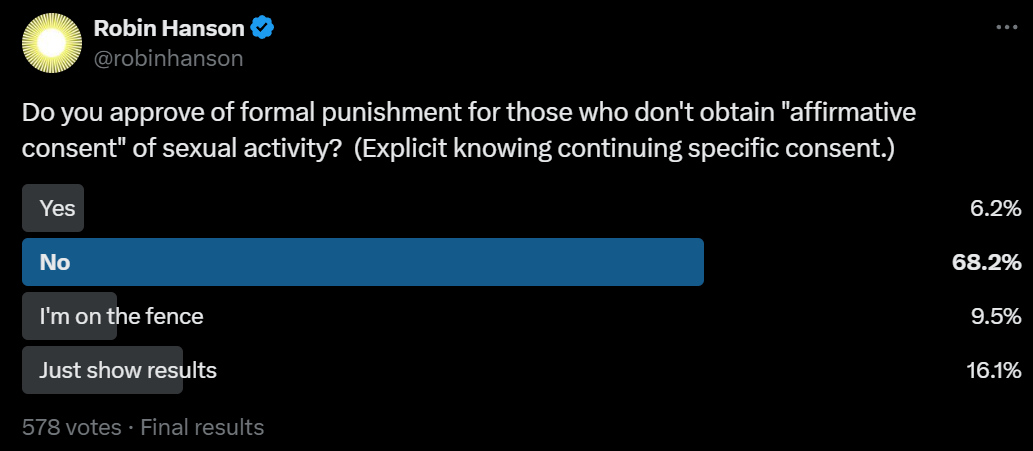
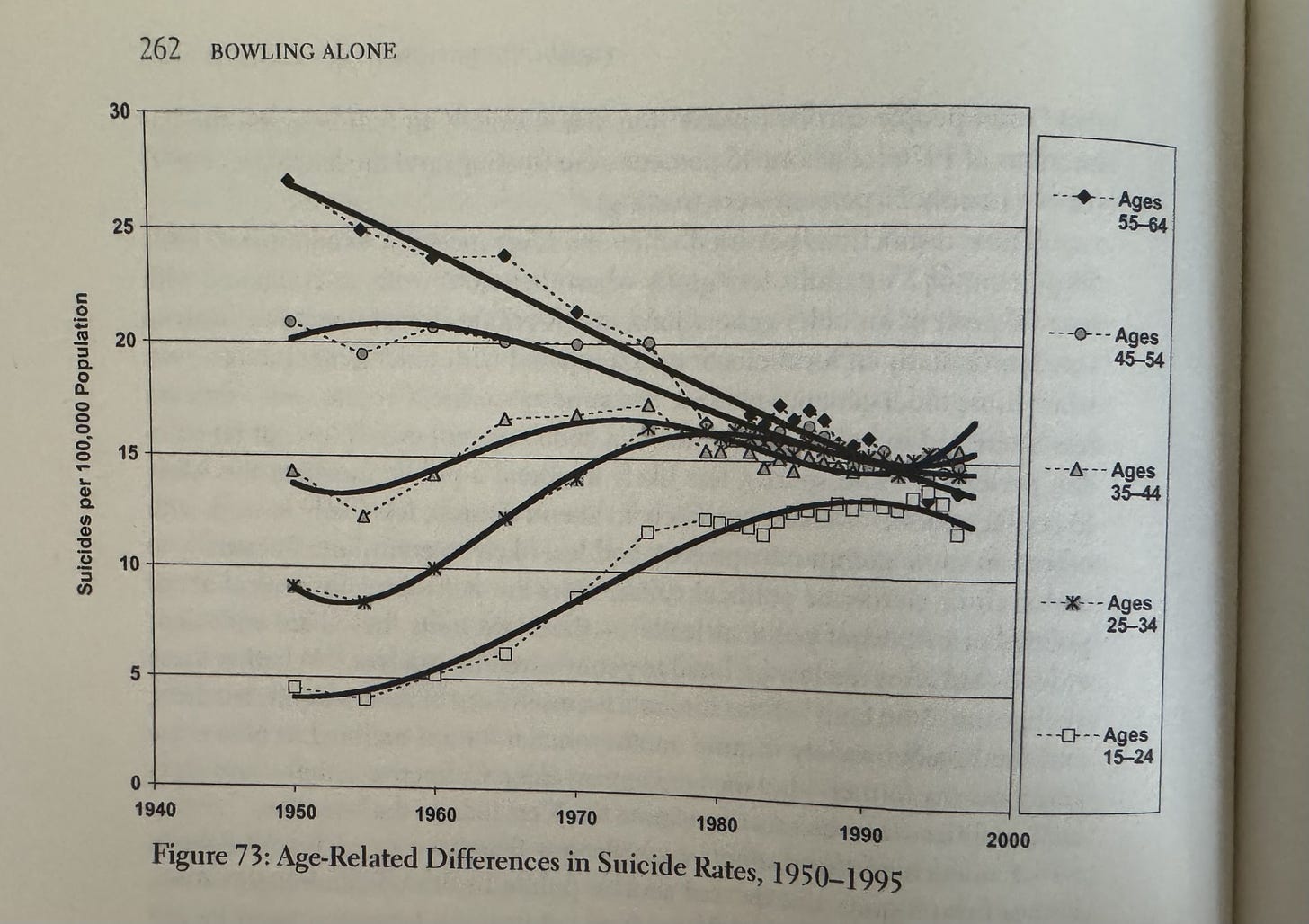
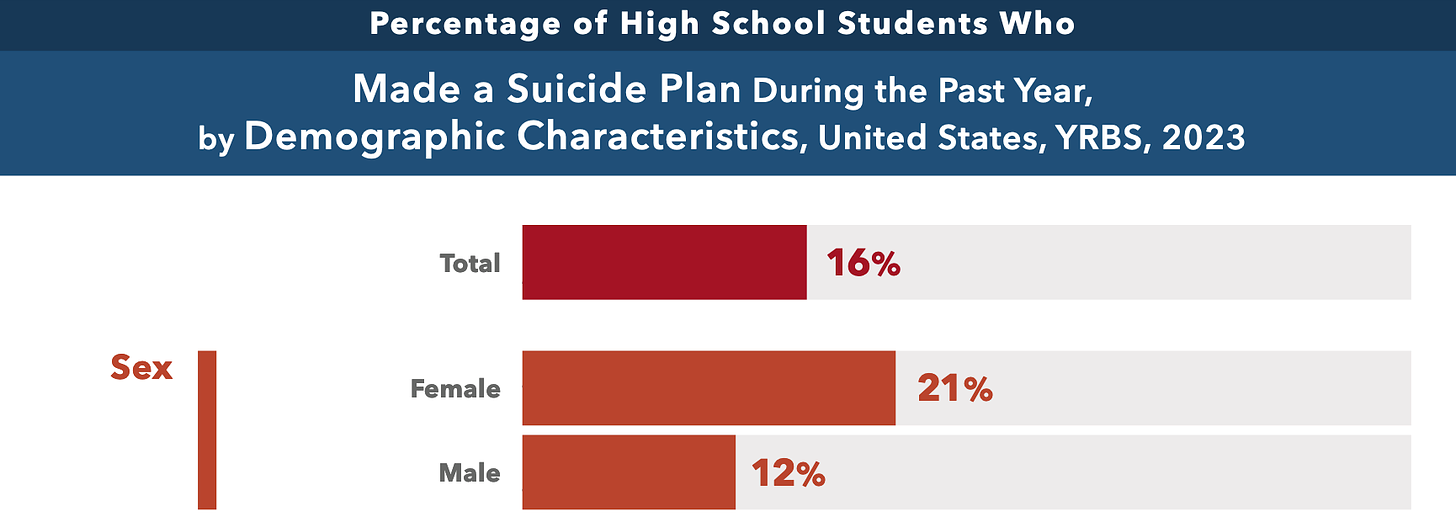
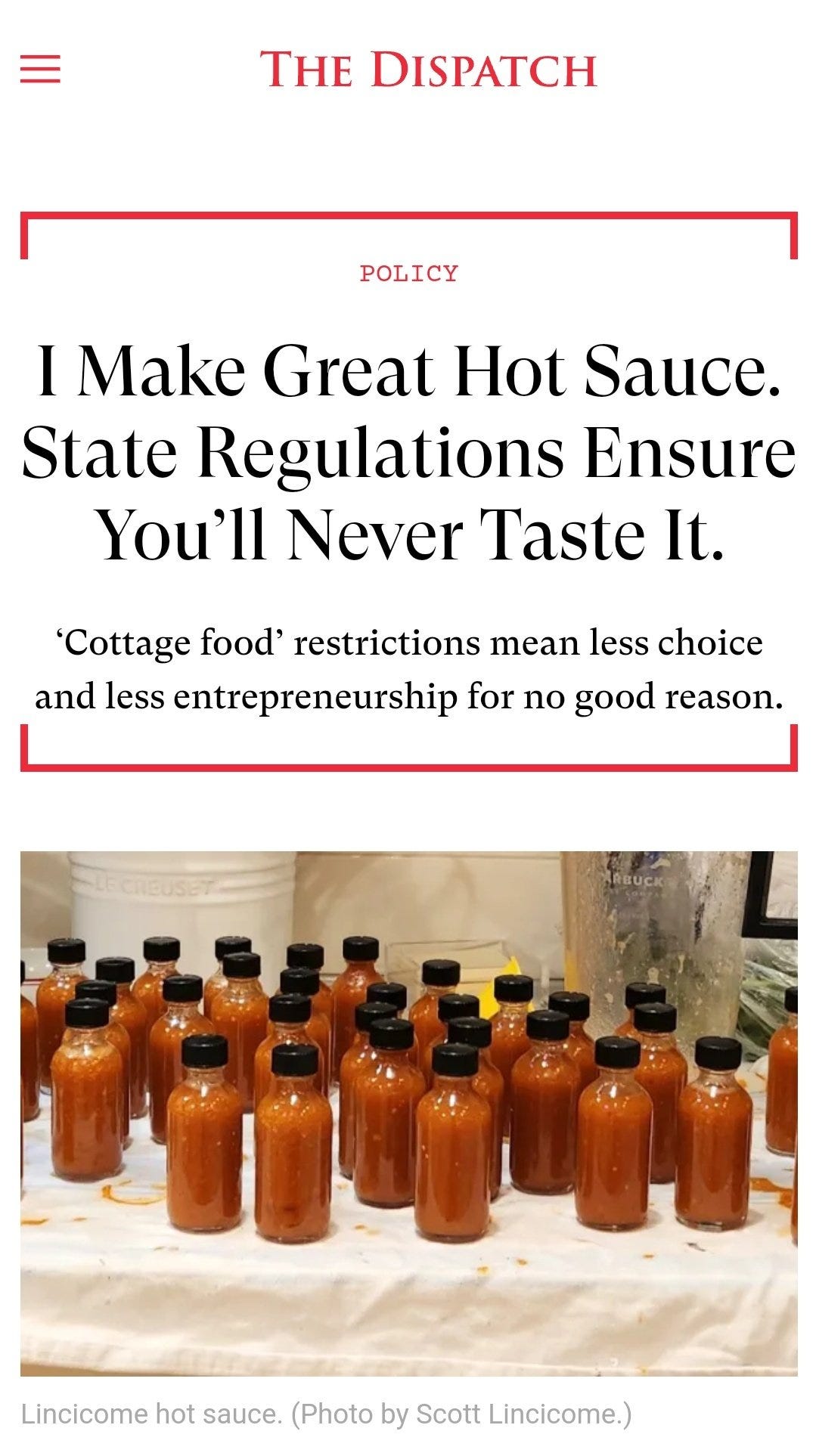


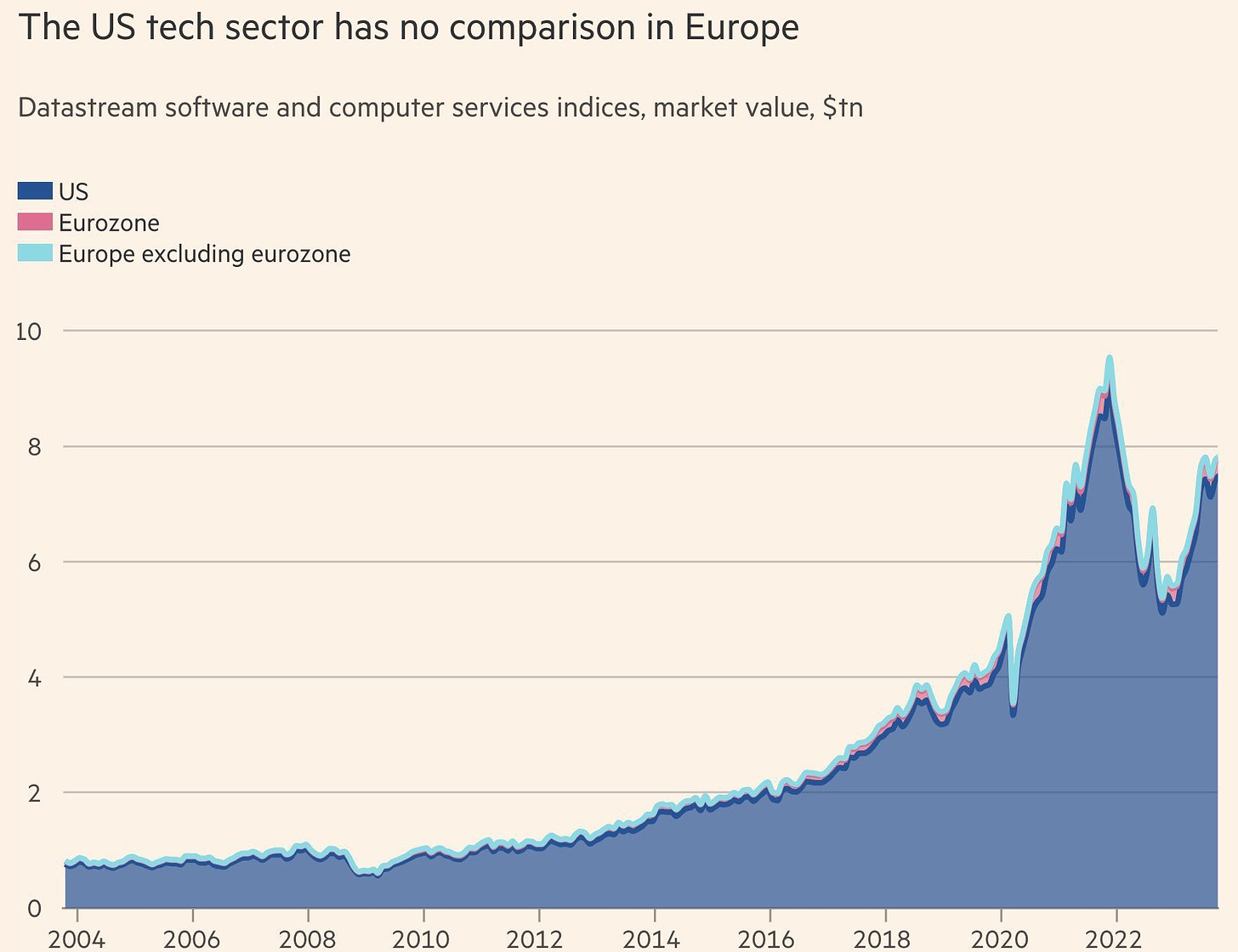
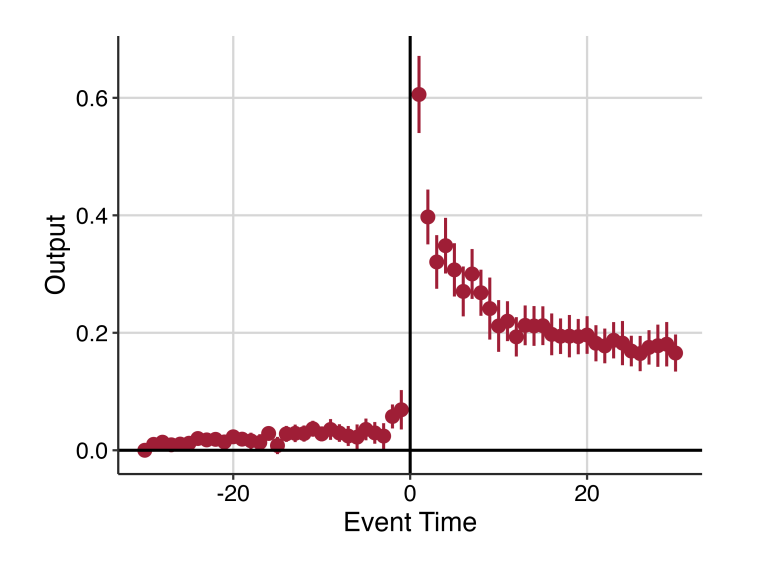


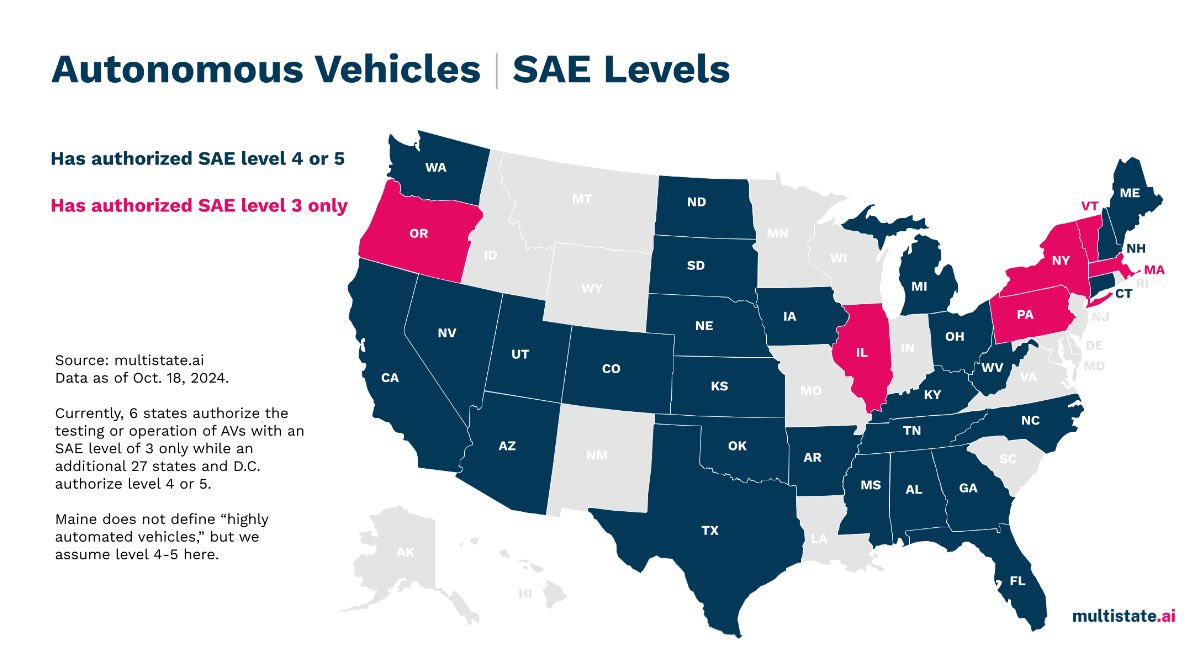
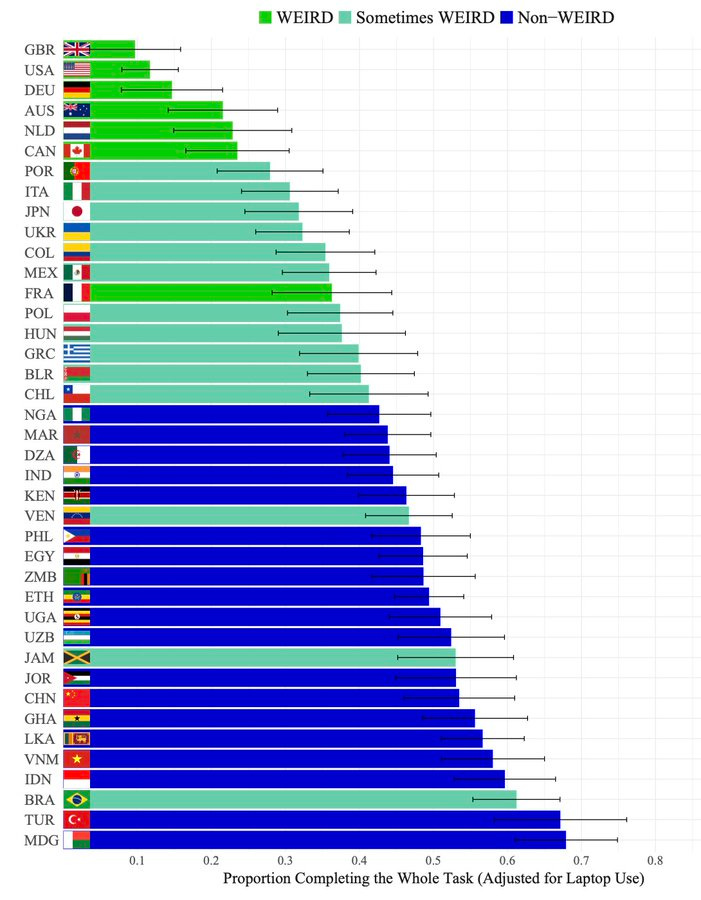
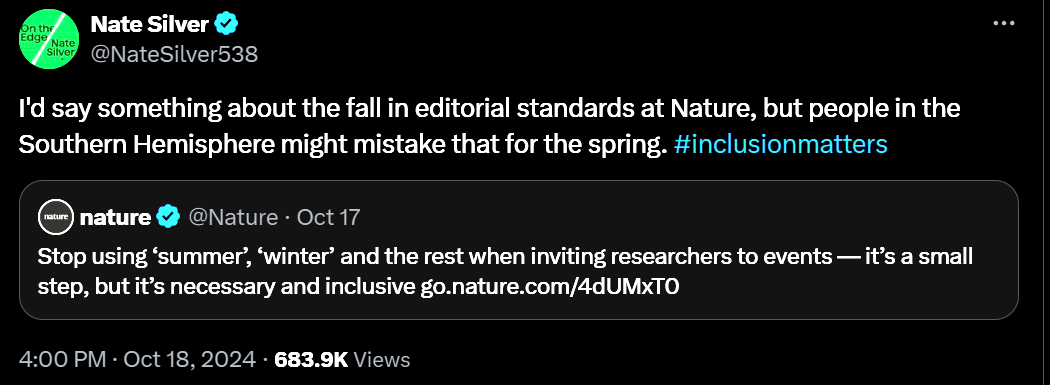
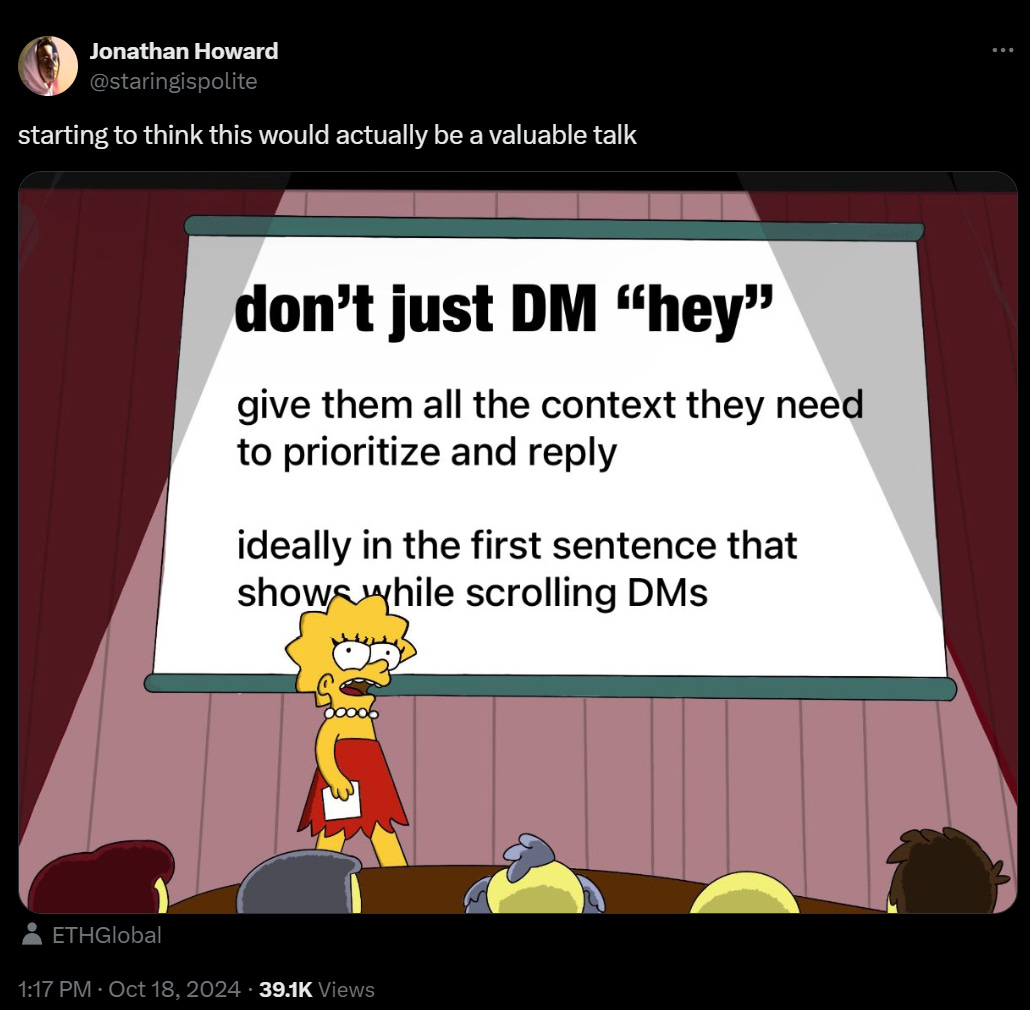


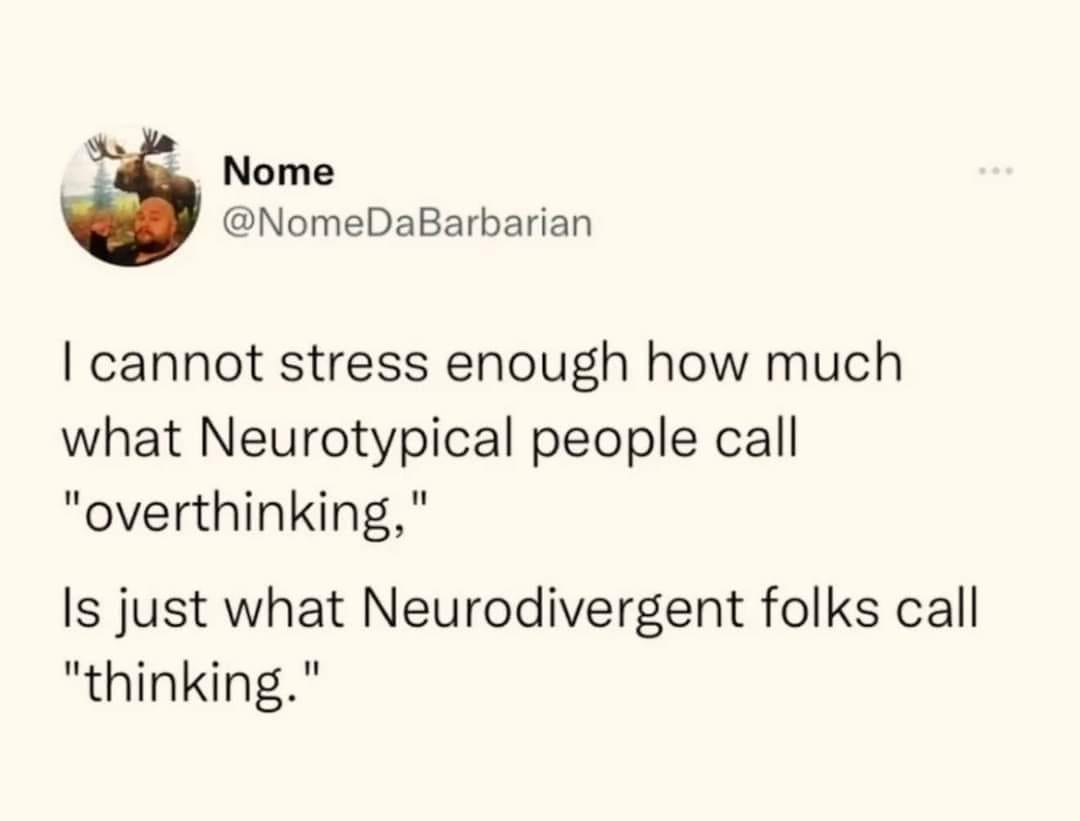
> So this is weird, because every calculator says that she should expect in the range of $34k/month in streaming income - but I do not think she would be lying about this.
Spotify pays ~$0.004/stream but Lily's share of that is a function of whatever deal she has with her record label. She's also splitting that most likely with other songwriters and producers on any given song/album. So her take-home could be a tiny fraction of the overall Spotify payout.
The kid leading the anti-pay toilet charge is (and surely was then) a mathematical genius: https://en.wikipedia.org/wiki/Ira_Gessel.
So it's not only the young who are stupid. Also geniuses acting outside their domains, culture- and time-bound to boot.